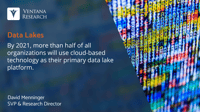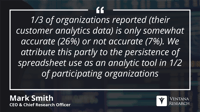Organizations are increasingly using data as a strategic asset, which makes data services critical. Huge volumes of data need to be stored, managed, discovered and analyzed. Cloud computing and storage approaches provide enterprises with various capabilities to store and process their data in third-party data centers. The advent of data platforms previously discussed here are essential for organizations to effectively manage their data assets.
Read More
Topics:
embedded analytics,
Analytics,
Business Intelligence,
Collaboration,
Data Governance,
Data Lake,
Data Preparation,
Data,
AI & Machine Learning,
Microsoft Azure
Since customer data platforms (CDP) emerged in the marketplace about five years ago, there has been debate about what roles they fill, especially within customer service organizations. They were originally developed by small software firms to provide marketing teams with a comprehensive view of customer records. Those records could be scattered throughout an organization, siloed by system and department. CDPs were an attempt to shortcut integration processes that are long, expensive and often...
Read More
Topics:
Customer Experience,
Marketing,
data artisan,
Data Governance,
Data Lake,
Data Preparation,
Data,
Information Management (IM),
intelligent marketing
The annual Ventana Research Digital Innovation Awards showcases advances in the productivity and potential of business applications, as well as technology that contributes significantly to improved efficiency and productivity in the processes and the performance of an organization. Our goal is to recognize technology and vendors that have introduced noteworthy digital innovations that advance business and IT.
Read More
Topics:
Analytics,
Collaboration,
Data Governance,
Data Lake,
Data Preparation,
IOT,
Data,
Information Management (IM),
Digital Technology,
blockchain,
Conversational Computing,
collaborative computing,
mobile computing,
extended reality,
AI & Machine Learning
A data lake is a centralized repository designed to house big data in structured, semi-structured and unstructured form. I have been covering the data lake topic for several years and encourage you to check out an earlier perspective called Data Lakes: Safe Way to Swim in Big Data? for background. Our data lake research has uncovered some points to consider in your efforts, and I’d like to offer a deeper dive into our findings.
Read More
Topics:
Data Governance,
Data Lake,
Information Management,
Data,
Digital Technology
Customer analytics have never been more important, but effectively creating and managing them is not easy. The data that’s required to achieve visibility into all customer activity involves many applications and systems and it’s a challenge to ensure the data used is accurate and consistent. Even once data is assembled, organizations often struggle to apply analytics to create the metrics that best represent an understanding of the past and, more importantly, the path to the future.
Read More
Topics:
Customer Experience,
Voice of the Customer,
embedded analytics,
Analytics,
Business Intelligence,
Collaboration,
Data Governance,
Data Lake,
Data Preparation,
Information Management,
Contact Center,
Data,
Digital Technology,
Digital Commerce,
blockchain,
natural language processing,
Intelligent CX,
Conversational Computing,
collaborative computing,
Subscription Management,
agent management,
extended reality,
AI & Machine Learning
By itself, data isn’t useful for business; the application of analytics is necessary to transform data into actionable information. Data analysis of one sort or another has long been a core competence of finance departments, applied to balance sheets, income statements or cash flow statements. Today, however, Finance must go beyond these basics by expanding the scope of the data being examined to include all financial and operational information that can yield actionable insights. Analysis thus...
Read More
Topics:
Customer Experience,
Human Capital Management,
Voice of the Customer,
embedded analytics,
Learning Management,
Analytics,
Business Intelligence,
Collaboration,
Data Governance,
Data Lake,
Data Preparation,
Information Management,
Internet of Things,
Contact Center,
Data,
Product Information Management,
Sales Performance Management,
Workforce Management,
Financial Performance Management,
Price and Revenue Management,
Digital Technology,
Digital Marketing,
Digital Commerce,
ERP and Continuous Accounting,
blockchain,
natural language processing,
robotic finance,
Predictive Planning,
candidate engagement,
Intelligent CX,
Conversational Computing,
Continuous Payroll,
revenue and lease accounting,
collaborative computing,
mobile computing,
Subscription Management,
total rewards management,
intelligent marketing,
intelligent sales,
AI & Machine Learning
Organizations’ use of data and information is evolving as the amount of data and the frequency with which that data is collected increase. Data now streams into organizations from myriad sources, among them social media feeds and internet-of-things devices. These seemingly ever-increasing volumes of devices and data streams offer both challenges and opportunities to capture information about a business and improve its operations.
Read More
Topics:
business intelligence,
embedded analytics,
Analytics,
Collaboration,
Data Lake,
Information Management,
Internet of Things,
Data,
Digital Technology,
AI & Machine Learning















